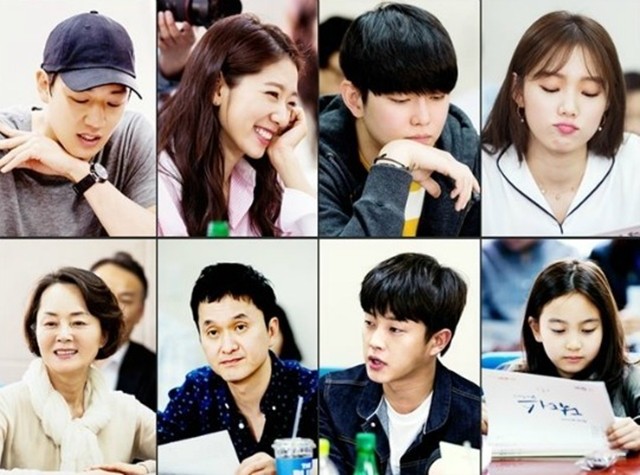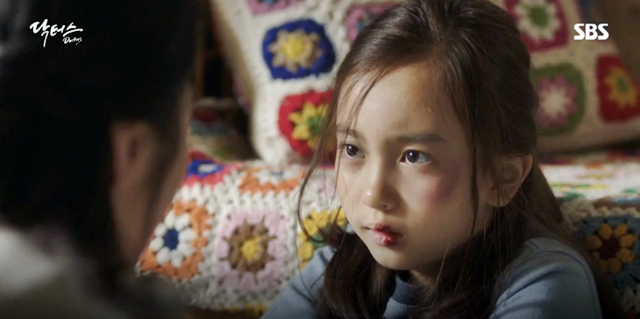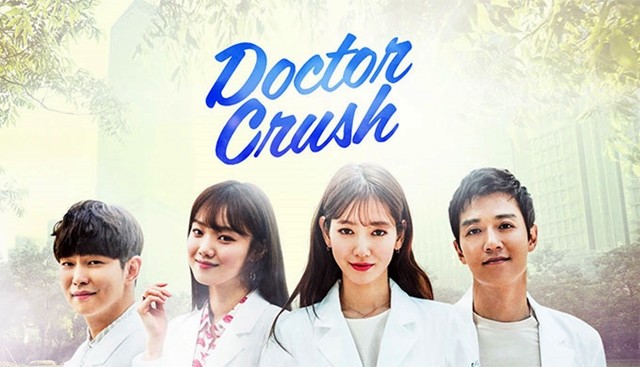By Jae-Ha Kim
jaehakim.com
September 30, 2016
![]() Hye-Jung (played by Park Shin-Hye)
Hye-Jung (played by Park Shin-Hye)
Ji-Hong (played by Kim Rae-Won)
Yoon-Do (played by Yoon Kyun-Sang)
I’ll be honest. This clip from “Doctor Crush” enticed me to tune into all 20 episodes of the series. In less than a minute, Hye-Jung brings a boy to his knees after he manhandles one of her friends. Another boy, who likes Hye-Jung, thinks he’s being chivalrous by telling his friends, “She’s mine. Don’t touch her.”
In most dramas, the girl would have thanked him for coming to her rescue. But Hye-Jung doesn’t need rescuing. She tells him, “You’re so embarrassing. Why am I yours? I’m mine.”
I wanted to see more moments like this. And for a few episodes, “Doctor Crush” really delivered. But when it delved too far into romance and some amateurish Nancy Drew-style sleuthing, the series lost momentum.
The Good:
The leads are both very good and their physical characteristics lend themselves well to the storyline. Both Hye-Jung and her mentor/love interest Ji-Hong overcame difficult childhoods to reach the top of their careers. The actors who play them — Park Shin-Hye and Kim Rae-Won, respectively — have expressive faces that evoke heartache, without their having to utter a sentence. They are able to make even some of the weaker storylines resonate. And, when they cry, viewers will need a tissue or two as well.
The Bad:
This series is full of bad characters full of bad intentions: the money-hungry father-son duo trying to take over the hospital; Ji-Hong’s uncle, who steals his inheritance and then dumps him off at an orphanage; Hye-Jung’s father, who abandons her; and even Hye-Jung’s raison d’etre for much of the series: revenge.
Yes, we all know that hospital residents and interns are overworked. But I really disliked how the physical abuse of the interns was played off for laughs. It is never appropriate for a hospital resident to hit his underlings on the head (or anywhere), because they didn’t meet expectations.
The Ugly:
I find it offensive when people are mistreated because of their looks. In “She Was Pretty,” the female character is treated poorly until she has a makeover and becomes attractive again. Everyone accepted it — sadly, even her. Here, one of the second-year medical students is called a pig, because of his size, and is dismissed by a woman who probably still remembers what it was a like to be an outcast in high school. I know this happens in real life. But it is really disconcerting to watch a series where this type of ugly behavior is not only tolerated, but played for laughs.

When the series opens, Hye-Jung is a neurosurgeon, who is reunited with her former high school teacher, Ji-Hong, who is also a neurosurgeon at the same hospital. The two share a complicated history. He was a boarder at her grandmother’s house. Though nine years apart in age, the two become friends, but never crossed the line between student and teacher. When a jealous classmate starts an online rumor that the two are having an affair, Ji-Hong resigns. Though she did nothing wrong, Hye-Jung apologizes. Ji-Hong rightly points out that he will be just fine.
“In today’s society, who do you think will suffer more from this scandal?” he asks rhetorically. “The man or the woman?”
Though she was uninterested in her studies and often got into trouble, Hye-Jong was smart and overcame her troubled home life. After her mother died, her cold father did nothing while her stepmother beat her. Not wanting to take responsibility for a strong-willed teenager, he severs ties with her, dumping her off at his mother’s house and telling her not to come back.
Later, as she is pursued romantically by Ji-Hong, Hye-Jung tells him, “My biggest fear is being thrown away.”

Though Ji-Hong appears to have led a charmed life, his youth was filled with sadness:
- He has survivor’s guilt. His parents died in an automobile accident, where he was the only survivor.
- He has trust issues. He spent a year at his uncle’s house, before being shipped off to an orphanage. His uncle would also steal his inheritance — the house he grew up in — justifying it as payment for taking care of him for that year.
- He knows what it is to grow up a loner. He was beaten up on a regular basis for being the smartest kid at school and an orphan. How dare someone so low on the food chain do so well?
His life fared much better after he was adopted by a wealthy doctor, who would die trying to save his hospital from becoming a haven for the rich at the expense of the indigent.
As is common in many Korean dramas, there is a love triangle. Both Ji-Hong and Yoon-Do — a handsome, but emotionally detached surgeon from a powerful family — are in love with Hye-Jung. The plot line was tedious, because it was obvious that Yoon-Do is a narcissist who loves no one more than himself. He loved the challenge of trying to get the girl who wasn’t interested in him, despite that fact that she told him point blank that she wasn’t interested.
Some might see his persistence as romantic, but how different are his actions from those of the teenagers (referenced in the first sentence) who wouldn’t leave the uninterested girls alone?
Best line:
A nurse refers to Yoon-Do as looking like a Siberian Husky. And if you were to pick an animal who he most resembled, she got it spot on!
Product placements:
ENOUGH with the Subway product placements. It was obnoxious enough in “Descendants of the Sun,” but the sandwich chain almost gets more screen time than some of the actors. No matter how much they try to dress the sandwiches up, the subs do not stack up to Korean food in general or many of the Western-style eateries in Korea. By comparison, the placements for phones and cosmetics were more subtle.
Original airdates:
The 20 episodes aired on Korea’s SBS from June 20 to August 23, 2016.
Hye-Jung’s high school nemesis is the daughter of the doctor who she blames for killing her grandmother in surgery. As a physician, she knows that doctors can’t save all patients. But when he refused to behave with compassion towards her grandmother’s death, Hye-Jung vowed to seek revenge on him. She transferred to his hospital, in the hopes of getting even. At the end of the series, she assists in a surgery that could’ve left him crippled. He survives, of course, but it is implausible to think that after all they had been through, he would accept her even being in the operating room during his surgery.
The writers do a good job of trying to manipulate the viewers’ feelings. Even after showing us how horrible Hye-Jung’s father was to her, they try to make him appear sympathetic when he reappears in her life as an old man, who has seemingly turned his life around. (They do the same with the father-son doctor team who were responsible in many ways for the death of Ji-Hong’s father.)
Instead of having Hye-Jung forgive her father for his awful treatment of her as a child, she tells him that she will always want what is best for him. But that in order for her to move on, she wants nothing to do with him or his family. I am so glad the writers didn’t choose to have her reconcile with her father. When a parent has done this kind of damage to his child’s life, he can’t expect to fix it by bringing a few bowls of soup and saying, “I’m sorry.” You can be sorry and become a better person, but that doesn’t give you the right to your child’s love.
Standout episodes:
Much of the series revolves around two factions: Ji-Hong and his father wanting everyone to get hospital care, regardless of whether they can pay for their stay; and the other father-son team who want to privatize hospital care “like in America” so that they can make more money. There’s a three-episode arc (episodes 13 to 15) that deals with two young brothers with brain cancer. Their father is struggling financially, trying to pay off the hospital bills for his late wife’s cancer treatments. Unable to pay for his sons’ treatments, he contemplates suicide, knowing that there is a program to help sick orphans. When a father is worth more dead than alive, there is a huge issue.
The final episode ends with the comatose victim of an automobile accident giving birth to a baby. She had been kept alive so that the baby could be delivered and dies shortly afterwards. Watching her husband (technically, they weren’t married yet. The accident occurred on the way to their wedding) grieve, I wondered if he was wealthy and, if not, how he would pay for the months his wife was in the hospital and the neonatal care his premature baby would need. Would he end up like the father mentioned above?
Adoption element:
Ji-Hong is the adopted son of wealthy doctor. The doctors trying to wrestle away his power at the hospital say that Ji-Hong isn’t a threat, because he’s not his “real” son — that the adoptive father could let him go at any time since he’s not a blood relation. This touches on the stigma of being an adoptee in Korean society, even in the 21st century.
Hye-Jung’s mother got pregnant when she was a college student. Instead of putting the baby up for adoption or having an abortion, she married her boyfriend, who proved to be a horrible father. After her mother died, her dad married a cruel woman who beat her. When she got in trouble again in high school, her father got fed up and dumped her at his mother’s house.
@2016 Jae-Ha Kim | All Rights Reserved






